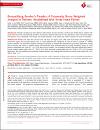Demystifying Smoker's Paradox: A Propensity Score-Weighted Analysis in Patients Hospitalized With Acute Heart Failure.

View/
Date
2019-12-01Author
Doi, Suhail AIslam, Nazmul
Sulaiman, Kadhim
Alsheikh-Ali, Alawi A
Singh, Rajvir
Al-Qahtani, Awad
Asaad, Nidal
AlHabib, Khalid F
Al-Zakwani, Ibrahim
Al-Jarallah, Mohammed
AlMahmeed, Wael
Bulbanat, Bassam
Bazargani, Nooshin
Amin, Haitham
Al-Motarreb, Ahmed
AlFaleh, Husam
Panduranga, Prashanth
Shehab, Abdulla
Al Suwaidi, Jassim
Salam, Amar M
...show more authors ...show less authors
Metadata
Show full item recordAbstract
Background Smoker's paradox has been observed with several vascular disorders, yet there are limited data in patients with acute heart failure (HF). We examined the effects of smoking in patients with acute HF using data from a large multicenter registry. The objective was to determine if the design and analytic approach could explain the smoker's paradox in acute HF mortality. Methods and Results The data were sourced from the acute HF registry (Gulf CARE [Gulf Acute Heart Failure Registry]), a multicenter registry that recruited patients over 10 months admitted with a diagnosis of acute HF from 47 hospitals in 7 Middle Eastern countries. The association between smoking and mortality (in hospital) was examined using covariate adjustment, making use of mortality risk factors. A parallel analysis was performed using covariate balancing through propensity scores. Of 5005 patients hospitalized with acute HF, 1103 (22%) were current smokers. The in-hospital mortality rates were significantly lower in current smoker's before (odds ratio, 0.71; 95% CI, 0.52-0.96) and more so after (odds ratio, 0.47; 95% CI, 0.31-0.70) covariate adjustment. With the propensity score-derived covariate balance, the smoking effect became much less certain (odds ratio, 0.63; 95% CI, 0.36-1.11). Conclusions The current study illustrates the fact that the smoker's paradox is likely to be a result of residual confounding as covariate adjustment may not resolve this if there are many competing prognostic confounders. In this situation, propensity score methods for covariate balancing seem preferable. Clinical Trial Registration URL: https://www.clinicaltrials.gov/. Unique identifier: NCT01467973.
Collections
- Medicine Research [1934 items ]

